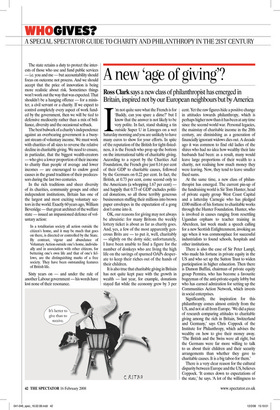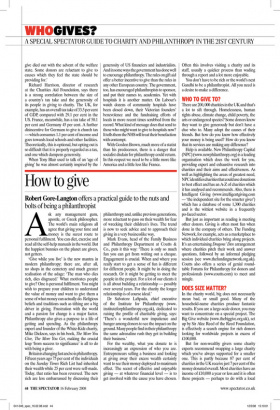A new ‘age of giving’?
Ross Clark says a new class of philanthropist has emerged in Britain, inspired not by our European neighbours but by America
I’m not quite sure what the French is for ‘Buddy, can you spare a dime?’ but I know that the answer is not likely to be very polite. In fact, stand shaking a tin outside Super U in Limoges on a wet Saturday morning and you are unlikely to have many euros to show for your efforts. In spite of the reputation of the British for tight-fistedness, it is the French who prop up the bottom on the international table of charitable giving. According to a report by the Charities Aid Foundation, the French give just 0.14 per cent of their GDP to charitable causes, followed by the Germans on 0.22 per cent. In fact, the British, at 0.73 per cent, come second only to the Americans (a whopping 1.67 per cent) — and happily that 0.73 of GDP excludes political donations, so all those terribly generous businessmen stuffing their millions into brown paper envelopes in the expectation of a gong don’t come into it.
OK, our reasons for giving may not always be altruistic: for many Britons the weekly lottery ticket is about as far as charity goes. And, yes, a few of the most apparently generous Brits are — to put it, well, charitably — slightly on the dotty side; unfortunately, I have been unable to find a figure for the number of donkeys who are living the high life on the savings of spurned OAPs desperate to keep their riches out of the hands of their children.
It is also true that charitable giving in Britain has not quite kept pace with the growth in wealth — last year, for example, donations stayed flat while the economy grew by 3 per cent. Yet the raw figures hide a positive change in attitudes towards philanthropy, which is perhaps higher now than it has been at any time since the second world war. Personal legacies, the mainstay of charitable income in the 20th century, are diminishing as a generation of financially ignorant widows dies out. A decade ago it was common to find old ladies of the shires who had no idea how wealthy their late husbands had been: as a result, many would leave large proportions of their wealth to a charity, not realising how much money they were leaving. Now, they tend to leave smaller fixed sums.
At the same time, a new class of philanthropist has emerged. The current pin-up of the fundraising world is Sir Tom Hunter, head of private equity group West Coast Capital and a latterday Carnegie who has pledged £100 million of his fortune to charitable works through the Hunter Foundation. Hunter, who is involved in causes ranging from resettling Ugandan orphans to teacher training in Aberdeen, last week made a speech calling for a new Scottish Enlightenment, invoking an age when it was commonplace for successful industrialists to found schools, hospitals and other institutions.
There is also the case of Sir Peter Lampl, who made his fortune in private equity in the US and who set up the Sutton Trust to widen participation in higher education. Then there is Damon Buffini, chairman of private equity group Permira, who has become a favourite bogeyman of the anti-private-equity lobby but who has earned admiration for setting up the Communities Action Network, which invests in social enterprises.
Significantly, the inspiration for this philanthropy comes almost entirely from the US, and not at all from Europe. ‘We did a piece of research comparing attitudes to charitable giving among the rich in Britain, Switzerland and Germany,’ says Chris Coppock of the Institute for Philanthropy, which advises the wealthy on how to give their money away. ‘The British and the Swiss were all right, but the Germans were far more willing to talk to us about their children and their security arrangements than whether they gave to charitable causes. It is a big taboo for them.’ There is a very clear reason for the cultural disparity between Europe and the US, believes Coppock. ‘It comes down to expectations of the state,’ he says. ‘A lot of the willingness to give died out with the advent of the welfare state. Some donors are reluctant to give to causes which they feel the state should be providing for.’ Richard Harrison, director of research at the Charities Aid Foundation, says there is a strong correlation between the size of a country’s tax take and the generosity of its people in giving to charity. The UK, for example, has an overall tax take of 33.5 per cent of GDP, compared with 29.1 per cent in the US. France, meanwhile, has a tax take of 50.1 per cent and Germany 45 per cent. A further disincentive for Germans to give is church tax — which consumes 1.1 per cent of income and goes towards local schools and other facilities. Theoretically, this is optional, but opting out is so difficult that it is properly regarded as a tax, and one which dampens generosity.
When Tony Blair used to talk of an ‘age of giving’ he was almost certainly inspired by the generosity of US financiers and industrialists. And in some ways the government has done well to encourage philanthropy. The rules on gift aid offer a better incentive to give than the rules in any other European country. The government, too, has encouraged philanthropists to sponsor, and put their names to, academies. Yet with hospitals it is another matter. On Labour’s watch dozens of community hospitals have been closed down, their Victorian founders’ benevolence and the fundraising efforts of locals in more recent times scrubbed from the record. What kind of message does that send to those who might want to give to hospitals now? It tells them the NHS will treat their benefaction with contempt.
With Gordon Brown, much more of a statist than his predecessor, there is a danger that socialist disdain for philanthropy could return. In this respect we need to be a little more like America and a little less like France.



















































































 Previous page
Previous page